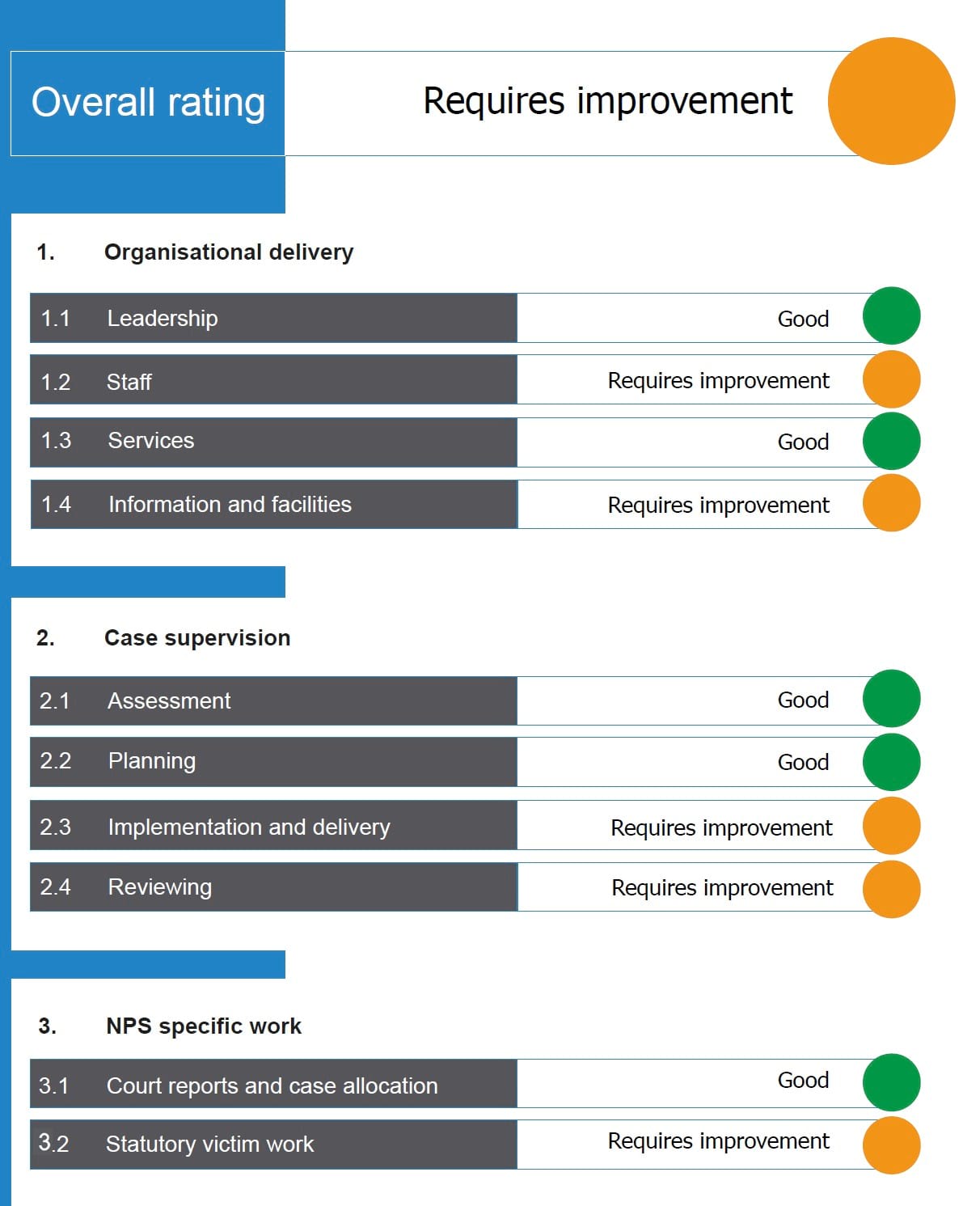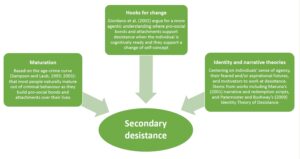Victim work particularly poor
The London division of the National Probation Service has the ignominy of being the first NPS area to be officially assessed as under-performing in today’s HMI Probation report.
Inspectors have formally rated London NPS as “requiring improvement” under its new system; the four other NPS divisions inspected so far have all been rated as “good”. Inspectors did find that London had made progress over the last two years but was still failing. Surprisingly, it was London’s Victim Contact Scheme (work rated as good or outstanding elsewhere) which was of particular concern.
The inspectors termed London’s work with victims as “wholly unsatisfactory”. In more than a fifth of inspected cases, victims of serious crime were not offered access to its Victim Contact Scheme. The statutory scheme provides victims with updates on the perpetrator’s sentence and gives them an opportunity to contribute their views on release plans.
Chief Inspector of Probation Dame Glenys Stacey said:
Some victims are not being offered a service at all, while others are receiving a service that is simply not good enough. There has been significant media, parliamentary and public interest in the London division’s work with victims in the Worboys case. The Secretary of State for Justice asked me to conduct an urgent review into the division’s work with victims, and this was published last year. It is deeply concerning to see that some victims of serious crime are still being failed by the service.
The division supervises more than 17,000 offenders in 29 offices, 12 approved premises (formerly known as probation or bail hostels) and nine prisons across the capital. Inspectors found staff have a sound understanding of the individuals under their supervision, and the assessment and planning of cases is done to a good standard overall.
The quality of the London division’s work to support decision-making in courts was rated ‘Good’. Inspectors found timely and largely comprehensive reports to help magistrates and judges in their sentencing decisions.
The division provides a comprehensive range of services to support individuals to turn away from crime. Services for female offenders are much improved since the last inspection. Projects to combat knife crime and improve access to accommodation show early promise.
Inspectors noted that London is the only one of the seven NPS divisions across England and Wales to have a Serious Case Advisory Unit. The unit provides profiling, advice and guidance on the handling of cases involving extremism, hate crime, gangs and serious organised crime. The division also leads or contributes to innovative multi-agency projects that tackle offences such as stalking and drugs-related crime in the gay community.
Inspectors were, however, concerned about aspects of the division’s work to protect the public. In one in five inspected cases, the probation officer and supervised individual do not have regular enough contact to manage and minimise the risk of harm safely.
As with other NPS divisions, there are staff shortages and issues with the national facilities management contract.
Dame Glenys said:
At the time of inspection, the London division had more than 150 unfilled vacancies and relied heavily on agency and temporary staff. High levels of attrition mean some offices lack experienced staff and this knowledge gap could potentially have an impact on the quality of services. Staffing problems are further exacerbated by high absence levels, with more than 10 per cent of staff absent through sickness or maternity leave.
As we have found elsewhere, the national facilities management contract is failing to make repairs in a timely way and there are often delays of several months. The neglect of basic maintenance is having a serious effect on this division. There are insecure doors and problems with operating CCTV; staff report feeling unsafe in some offices. The lack of upkeep resulted in the temporary closure of offices and the temporary loss of beds in the approved premises. We recommend the Ministry of Justice, which manages the contract, steps in.
I summarise the findings in more detail below.
Key findings
Inspectors organised their key findings under three main headings: organisational delivery; case supervision and NPS-specific (court reports/case allocation and statutory victim work).
Organisational delivery
Inspectors’ main findings on this domain were mixed:
- Senior leaders in the London division of the NPS have a strategy and vision to deliver high-quality work to reduce the risk of reoffending and support public protection. Staff at all levels were clear about the overall focus on delivering effective work. The divisional delivery plan and local cluster delivery plans support this approach.
- There are staff shortages and high levels of staff absence. New staff are being brought in to replace both current and anticipated shortfalls in the staffing profile, but these will take time to embed into the organisation. Agency and other temporary staff are employed to plug shortfalls in the staffing complement. With high levels of sickness and other absences, however, they do little more than cover the absences of in-house staff, rather than filling substantive vacancies. Recruitment and retention of staff in the capital are problematic: starting salaries are higher in similar organisations, including the Community
Rehabilitation Company (CRC) and youth offending teams. - The division has analysed the profile of those it is working with and made efforts to ensure services are available to meet their needs. The diversity of those supervised means this is a challenging task. There are pockets of innovation, and good co-working with external agencies. A strategy for female offenders has been developed and the division is now able to provide a much-improved service to women. Strategic relationships with the CRC are much improved.
- Poor facilities and delayed responses to building issues have affected service delivery. The facilities management contract provided through the Ministry of Justice is not working well and business critical issues are not dealt with swiftly enough. Recent information and communication technology (ICT) outages have demonstrated that contingency planning in the NPS needs to be more robust to minimise the impact of ICT issues on the delivery of a quality service.
Case supervision
- Assessments appropriately analysed factors linked to both desistance and harm in most cases. Factors linked to risk of harm were less routinely considered, however. Active risk management system (ARMS) assessments are required to assess those convicted of a sexual offence. Those done were not always complete; moreover, there are a significant number of outstanding assessments across the division.
- Sentence plans focused on reducing the risk of reoffending and engaging the individual but were less clear about how work would focus on keeping people safe. Planning appropriately engaged individuals at the start of their sentence in more than three-quarters of cases. The plans focused on those factors that would support desistance, and were appropriately responsive to the needs of the individual. Plans were less clear about how work would be delivered to reduce the risk of harm presented. Risk management plans lacked focus and detail, and contingency planning was lacking in some cases.
- Plans did not lead often enough to the delivery of interventions that support desistance and reduce risk. In one-third of cases, insufficient work had been completed to support desistance and a reduction in reoffending.
- Reviews were not completed in some cases and did not focus sufficiently on managing risk of harm. Reviews were often not completed as required. Some plans had not been reviewed. In others, factors linked to reoffending and supporting desistance had not been adequately reviewed.
Court reports and case allocation
- The London division of the NPS supports decision-making in courts by providing timely and largely comprehensive reports. Almost three-quarters of reports provided to courts were sufficiently detailed and personalised for the individual. They appropriately addressed factors linked to reoffending and considered the person’s motivation and readiness to change. Not all reports considered the factors linked to risk of harm where they should have done.
Statutory victim work
- The London division of the NPS is not supporting the needs of victims of violent and sexual offences well enough. In at least one in five cases reviewed, those who could be eligible for the Victim Contact Scheme were not given the opportunity to access it. Those who had accessed the scheme were not supported appropriately across the division, and victims’ views were not always appropriately considered, including at the pre-release point.
Conclusion
The Probation Inspectorate works on a four-band rating system: excellent, good, requires improvement and poor. This is the nineteenth inspection under the new rating system, but only the fifth of a NPS division and the first time that public sector probation has been assessed as sub-standard.
Given the MoJ’s recent decision to return all offender management responsibilities to the NPS, London needs to improve its performance rapidly although it is not easy to see how it can tackle staff shortages effectively given the lack of a competitive wage level provided by the MoJ.
As you can see below, the London Division of NPS disrupts the placings in my unofficial probation league table, which had previously seen all public sector probation areas out-performing their private sector counterparts.









